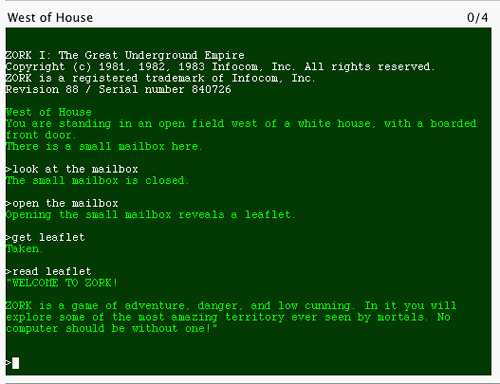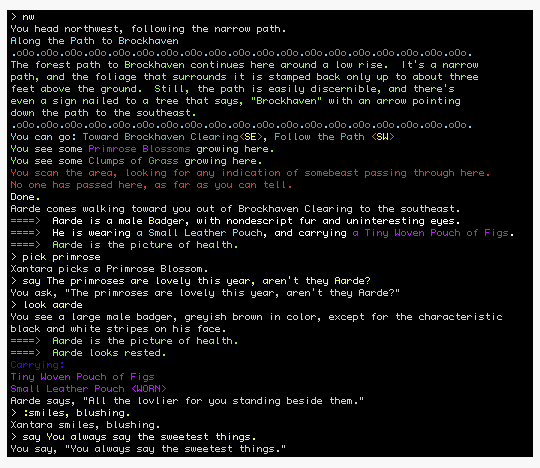The easiest and most accurate way to define what a 'MUCK' is would be to say that it is an 'interactive online text adventure'. However, the term 'text adventure' is meaningless to most people today, since most text adventures went out of vogue over twenty years ago. Perhaps, then, it is best to define what a text adventure is and go from there.
Back in the early days of computers, graphic files were huge and clumsy. The files took up a lot of space, and back then our technology for cramming a lot of memory space into a small machine was nothing like it is today. Thus, early video games involved large consoles, large game cartridges, and graphics that were blocky and limited in their capabilities for movement. Interactivity was limited to a few key 'moves'. Frogger, for example, could jump forward, left, right and back, and that was pretty much it. Mario could run, jump or climb. Galaga ships could move left, move right, and fire. Pac-man could move and bite.
At the time, these graphical games were more than sufficient to hold our attention. However, there were those who saw the potential for adventure games in which a player guided a character who through an adventure, in which the character would meet and defeat enemies, gather items and use them, and ultimately achieve some forsworn goal. These are the developers who went on to create video games like Legend of Zelda, Sonic the Hedgehog, Kingdom Hearts, Warcraft, Doom, Quake, etc. In short, this format for video games has such universal appeal that nearly all contemporary games involve some sort of role-playing.
But back then, graphics weren't up to rendering the images needed to make a convincing story come to life. Therefore, the earliest games of this sort didn't bother with graphics at all. Instead, they used text to describe places and items, and the player used text to direct the character through the adventure.
The best remembered games of this type were created by InfoCom, and many of them are still available on the web. Here's one site that has several posted:
The games generally required a player to enter commands like 'look here', 'get jug' 'say hello', 'read the sign', eat bread, look at the oven, etc. Some of these actions were necessary to complete the game others might reveal hidden clues, others might just cause interesting thingst to happen.
 A Sample Shot Of An Actual Infocom Text Adventure
A Sample Shot Of An Actual Infocom Text Adventure
MUCKs work approximately the same way, with a few key differences. Most notably, a MUCK allows more than one player to play at a time. Players create and describe their own characters, and are able to interact with other players as their characters move through the game. In short, MUCKs are to Text Adventures what Word of Warcraft is to Warcraft. They are the text version of MMORPGS.
 A Sample Of Player Interaction On A MUCK
A Sample Of Player Interaction On A MUCK